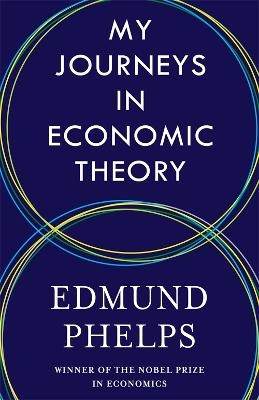
My Journeys in Economic Theory
Seiten
2024
Columbia University Press (Verlag)
978-0-231-21910-5 (ISBN)
Columbia University Press (Verlag)
978-0-231-21910-5 (ISBN)
- Noch nicht erschienen (ca. Dezember 2024)
- Portofrei ab CHF 40
- Auch auf Rechnung
- Artikel merken
Edmund Phelps is among the most important economists of his generation. In this book, Phelps tells the story of his role in reshaping economic theory, offering a powerful personal account of a creative and rewarding career.
Edmund Phelps is among the most important economists of his generation. He developed a new understanding of unemployment and inflation and went on to rethink the roots of innovation. His work represents a lifelong project to put “people as we know them” into economic theory.
In this book, Phelps tells the story of his role in reshaping economic theory, offering a powerful personal account of a creative and rewarding career. My Journeys in Economic Theory charts two major phases of Phelps’s work, illuminating the breadth of his contributions to the field. First, introducing the expectations of wage setters and cofounding the “equilibrium” rate of unemployment, he built the microeconomic foundations for the employment theory pioneered by Keynes and Hicks. More recently, he conceived a theory of “mass flourishing” superseding Schumpeter and Solow’s conception of the process of innovating—a theory in which individuals’ creativity and society’s dynamism fuel grassroots innovation and generate job satisfaction in the process.
Phelps recounts his vivid experiences in the world of economics—fierce arguments, competition and collaboration, and the good fortune of time spent among some great figures—as well as his relationships with luminaries such as John Rawls, Thomas Nagel, Paul Samuelson, and Paul Volcker. At its core, this book shares the joy of intellectual achievement: the excitement of coming up with a new idea that radically departs from prevailing views and the satisfaction of exercising one’s own ingenuity instead of applying or developing others’ models. Telling the story of a life packed with intellectual adventure, My Journeys in Economic Theory provides a profound vision of a dynamic, modern economy that offers lives rich with creativity and meaning.
Edmund Phelps is among the most important economists of his generation. He developed a new understanding of unemployment and inflation and went on to rethink the roots of innovation. His work represents a lifelong project to put “people as we know them” into economic theory.
In this book, Phelps tells the story of his role in reshaping economic theory, offering a powerful personal account of a creative and rewarding career. My Journeys in Economic Theory charts two major phases of Phelps’s work, illuminating the breadth of his contributions to the field. First, introducing the expectations of wage setters and cofounding the “equilibrium” rate of unemployment, he built the microeconomic foundations for the employment theory pioneered by Keynes and Hicks. More recently, he conceived a theory of “mass flourishing” superseding Schumpeter and Solow’s conception of the process of innovating—a theory in which individuals’ creativity and society’s dynamism fuel grassroots innovation and generate job satisfaction in the process.
Phelps recounts his vivid experiences in the world of economics—fierce arguments, competition and collaboration, and the good fortune of time spent among some great figures—as well as his relationships with luminaries such as John Rawls, Thomas Nagel, Paul Samuelson, and Paul Volcker. At its core, this book shares the joy of intellectual achievement: the excitement of coming up with a new idea that radically departs from prevailing views and the satisfaction of exercising one’s own ingenuity instead of applying or developing others’ models. Telling the story of a life packed with intellectual adventure, My Journeys in Economic Theory provides a profound vision of a dynamic, modern economy that offers lives rich with creativity and meaning.
Edmund Phelps, the sole winner of the Nobel Memorial Prize in Economic Sciences in 2006, is the McVickar Professor Emeritus of Political Economy at Columbia University, where he was also the founding director of the Center on Capitalism and Society.
Preface
Introduction: Formative Years
1. Starting My Career: Golden Rule of Saving and Public Debt
2. A New Direction: Uncertainty and Expectations
3. Unemployment, Work’s Rewards, and Job Discrimination
4. Altruism and Rawlsian Justice
5. Supply-Siders, New “Classicals,” and an un-Keynesian Slump
6. A Revolutionary Decade
7. A Festschrift, a Nobel, and a New Horizon
8. The Great Wave of Indigenous Innovation, Meaningful Work, and the Good Life
Epilogue
Acknowledgments
Notes
Index
| Erscheint lt. Verlag | 31.12.2024 |
|---|---|
| Verlagsort | New York |
| Sprache | englisch |
| Maße | 140 x 216 mm |
| Themenwelt | Literatur ► Biografien / Erfahrungsberichte |
| Wirtschaft ► Volkswirtschaftslehre ► Makroökonomie | |
| ISBN-10 | 0-231-21910-5 / 0231219105 |
| ISBN-13 | 978-0-231-21910-5 / 9780231219105 |
| Zustand | Neuware |
| Haben Sie eine Frage zum Produkt? |
Mehr entdecken
aus dem Bereich
aus dem Bereich
Volkswirtschaftslehre für eine sich ändernde Welt
Buch | Hardcover (2024)
De Gruyter Oldenbourg (Verlag)
CHF 62,90
Kompakt und prüfungsrelevant für Wirtschaftswissenschaftler
Buch | Softcover (2021)
Vahlen, Franz (Verlag)
CHF 16,65
Makroökonomie, Wirtschaftspolitik und nachhaltige Entwicklung
Buch | Hardcover (2022)
Vahlen (Verlag)
CHF 69,70


